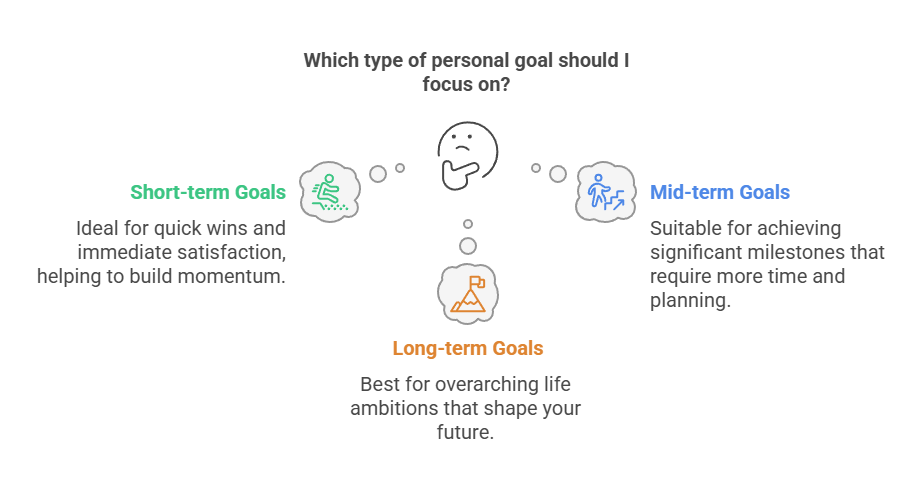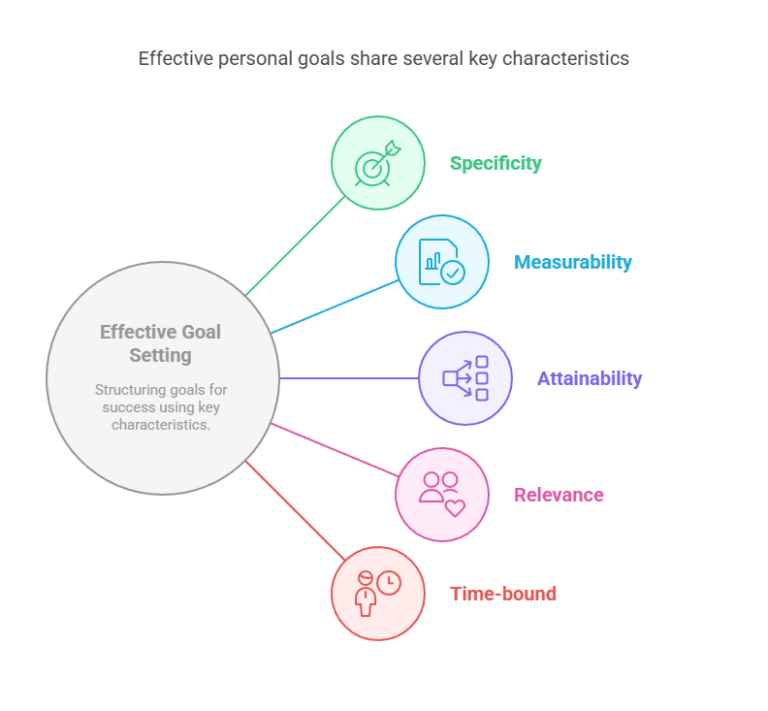Setting personal goals is about far more than simply creating a to-do list it’s about charting a deliberate course for your life’s journey. Meaningful goals provide direction, purpose, and the framework to transform your deepest aspirations into tangible achievements. When you establish clear, attainable objectives, you create a roadmap that guides your daily decisions and shapes who you ultimately become.
Why Personal Goals Matter
🔹Why Do We Set Goals in the First Place?
It might seem obvious, but understanding why we set personal goals significantly impacts how we approach them. Goals act as powerful anchors, preventing us from drifting through life without clear direction. They support our journey toward personal growth and self-improvement, giving structure to our deepest desires.
When you set truly personal goals—ones that reflect what you genuinely wish to achieve—they become powerful motivational forces. These goals shape your decisions, bring a sense of purpose to your daily actions, and define not just where you’re headed, but who you’re becoming along the way. They transform vague wishes into concrete plans with measurable outcomes.
🔹From Daydreams to Direction
Interestingly, meaningful goals often emerge from daydreaming. Those quiet moments when you imagine future possibilities can become the seeds of significant life changes. Writing down these aspirations—or recording them as voice notes—can transform fleeting thoughts into real, structured goals. These early, imaginative ideas often evolve into the milestones that guide your personal development journey.
Types of Personal Goals
Personal goals come in different forms, each serving unique purposes in your development:

Short-term goals: These are objectives you can achieve relatively quickly, typically within weeks to a year. They might include learning basic phrases in a new language, establishing a daily meditation practice, or completing a home organizing project. Short-term goals often provide quick wins that build momentum and confidence.
Mid-term goals: Taking roughly one to three years to accomplish, mid-term goals require more sustained effort. Examples might include mastering intermediate skills in a musical instrument, saving for a significant travel experience, or transforming your physical fitness. These goals bridge the gap between immediate achievements and long-term aspirations.
Long-term goals: These ambitious objectives might take several years or even decades to fully realize. They include major life achievements like becoming fluent in multiple languages, writing a novel, or achieving financial independence. Long-term goals provide the overarching vision that gives meaning to your shorter-term efforts.
Each type of goal serves an important purpose, and a balanced life typically includes a mix of all three. This creates a cascade of achievements short-term wins that build toward mid-term successes that ultimately contribute to your most significant life accomplishments.
🌟 Setting Goals That Stick: The 5 Key Characteristics of Effective Goals
Creating goals that inspire action and lead to real change requires more than just wishful thinking. Successful goals are built with clarity, intention, and structure. Below are five essential characteristics that define powerful and achievable personal goals:

🎯 1. Specificity
Goals need to be clearly defined. A specific goal removes confusion and directs your focus. It tells you exactly what you’re aiming for, boosting clarity and motivation. When you know what success looks like, you’re more likely to stay on track and take consistent action.
📏 2. Measurability
A measurable goal helps you track progress and recognize achievements. When you include numbers or milestones, it becomes easier to see how far you’ve come and what’s left. This keeps you accountable and motivated as you check off each step.
✅ 3. Attainability
Goals should challenge you without overwhelming you. Setting realistic, attainable goals ensures you’re working within your current resources and abilities. Unrealistic goals can lead to frustration, while achievable ones build confidence and momentum.
❤️ 4. Relevance
Your goals should reflect your values and long-term vision. A relevant goal feels meaningful, making it easier to stay committed. When your goals align with what truly matters to you, you’re more likely to stay motivated and follow through—even during tough times.
⏳ 5. Time-Bound
Every goal needs a deadline. A time frame adds urgency and helps you plan better. Without one, goals can be delayed or forgotten. Time-bound goals give structure, helping you stay focused and moving forward.
Overcoming Goal-Setting Challenges
🔹Common Goal-Setting Roadblocks
Even the most carefully crafted goals encounter obstacles. Common challenges include fading motivation after the initial excitement, unexpected setbacks that disrupt progress, and competing priorities that pull attention elsewhere. Recognizing these hurdles early on is key to managing them effectively. Without strategies to address these challenges, even meaningful goals can lose momentum.
🔹How to Stay on Track and Adjust When Needed
To overcome these roadblocks, build accountability into your routine. Share your goals with a trusted friend or mentor who can check in on your progress. Visual tools like habit trackers, vision boards, or progress charts make your journey more tangible and motivating. Small environmental changes—like a sticky note reminder or a dedicated workspace—can also help you stay focused.
Importantly, learn to see setbacks not as failures, but as valuable feedback. Every challenge offers insight into what works and what needs adjustment. And don’t hesitate to revise your goals as your life evolves. Flexibility isn’t a sign of weakness—it’s a sign of wisdom and personal growth.
Celebrating Progress
Goal achievement isn’t only about reaching the final destination it’s equally about appreciating the journey. Celebrating small victories along the way provides emotional reinforcement that sustains motivation. These celebrations acknowledge progress, build confidence, and create positive associations with the effort involved in pursuing meaningful goals.
Regular reflection also plays a crucial role in effective goal pursuit. Taking time to consider what’s working, what isn’t, and how you might adjust your approach improves your chances of success while deepening the learning that accompanies any worthwhile endeavour.
FAQs
❓ 1. What are personal goals and why are they important?
Personal goals are specific objectives that help you improve your life—whether in health, relationships, finances, or self-growth. They provide direction, purpose, and measurable progress.
❓ 2. What’s the difference between short-, mid-, and long-term goals?
Short-term: Achievable within a few days to 1 year (e.g., starting a routine).
Mid-term: Take 1–3 years (e.g., earning a certification).
Long-term: Major life goals over several years (e.g., becoming financially independent).
❓ 3. How do I set goals I’ll stick to?
Use the SMART method:
Specific, Measurable, Attainable, Relevant, Time-bound.
Align them with your values and break them into small, doable steps.
❓ 4. What if I lose motivation?
Revisit your “why”
Share your goal for accountability
Break it down further
Celebrate small wins
Adjust if it no longer fits your life
❓ 5. Can goals change?
Yes. As you grow, your goals should evolve too. Adapting goals shows growth, not failure.
❓ 6. How do I track progress?
Try journaling, habit trackers, apps like Trello or Notion, or vision boards. Regular reviews help you stay on course.
❓ 7. Why do people struggle with goals?
Common reasons include vague goals, lack of planning, or misalignment with values. The fix? Be intentional, and review goals regularly.
❓ 8. Should I celebrate small wins?
Absolutely! 🎉 Small wins build momentum, reinforce good habits, and make the journey enjoyable.
#PersonalGoals #GoalSetting #IntentionalLiving #LifeGoals #SelfGrowth #SelfImprovement #GoalPlanning #MindfulLiving #SuccessMindset #AchieveYourGoals #SMARTGoals #GrowthJourney #LifePlanning #EmpoweredLiving #ClarityToSuccess
Editor’s Note: This article was originally published here https://thelifetrackr.com/personal-goals-the-foundation-of-intentional-living/by @Kairav and @krutika
